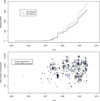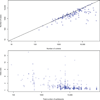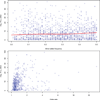Genome-wide association studies and beyond
- PMID: 20235850
- PMCID: PMC3997166
- DOI: 10.1146/annurev.publhealth.012809.103723
Genome-wide association studies and beyond
Abstract
Genome-wide association studies (GWAS) provide an important avenue for undertaking an agnostic evaluation of the association between common genetic variants and risk of disease. Recent advances in our understanding of human genetic variation and the technology to measure such variation have made GWAS feasible. Over the past few years a multitude of GWAS have identified and replicated many associated variants. These findings are enriching our knowledge about the genetic basis of disease and leading some to advocate using GWA study results for genetic testing. For many of the GWA study results, however, the underlying mechanisms remain unclear and the findings explain only a limited amount of heritability. These issues may be clarified by more detailed investigations, including analyses of less common variants, sequence-level data, and environmental exposures. Such studies should help clarify the potential value of genetic testing to the public's health.
Figures




Comment in
-
Overview of the symposium on public health significance of genomics and eco-genetics.Annu Rev Public Health. 2010;31:1-8. doi: 10.1146/annurev.publhealth.012809.103639. Annu Rev Public Health. 2010. PMID: 20001819
References
-
- Chanock SJ, Manolio T, Boehnke M, Boerwinkle E, Hunter DJ, et al. Replicating genotype-phenotype associations. Nature. 2007;447:655–660. - PubMed
-
- Clayton DG, Walker NM, Smyth DJ, Pask R, Cooper JD, et al. Population structure, differential bias and genomic control in a large-scale, case-control association study. Nat. Genet. 2005;37:1243–1246. - PubMed
Publication types
MeSH terms
Grants and funding
LinkOut - more resources
Full Text Sources
Other Literature Sources
Miscellaneous

